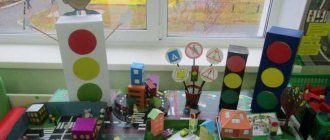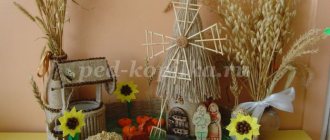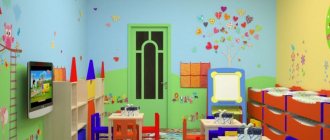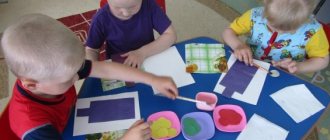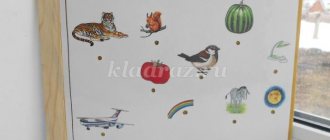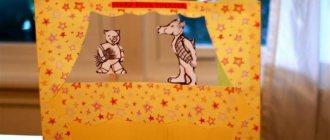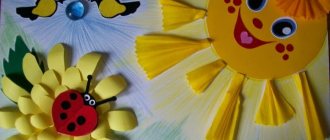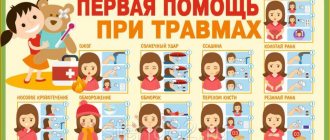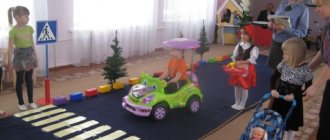A great many useful ideas for creating centers and arranging thematic corners for studying traffic rules are collected in the materials in this section. Meaningful, colorful and informative corners on the basics of traffic rules, intended for both children and their parents. Multifunctional centers for learning traffic rules, made by yourself.
When the need arises to create such teaching materials and manuals, you want the design result to be not only useful, but also effective and unusual. Using the publications in this section, you can successfully solve this problem.
Good ideas for creating better traffic centers and corners.
Contained in sections:
- Safety, life safety. Safety Corners and Centers 291
- Traffic rules Traffic rules for children 26015
By groups:
- Senior group
- Preparatory group
- Middle group
Showing publications 1-10 of 788. All sections | Traffic rules Corners and centers
New
Photo
The best
Traffic regulations corner
The safety of children is the most important task for parents, educators and all adults who surround them. This work is purposefully carried out in all educational institutions, starting from a young age in kindergarten and gives positive results. The main task…
Didactic manual “Lapbook on traffic rules” for children of middle and senior preschool age
Municipal budgetary preschool educational institution "Kindergarten No. 27"
Didactic manual Lapbook on traffic rules for children of middle and senior preschool age. Authors: Abasheva Fatima Nasikhovna, Educator, SZD Veronika Georgievna Nagovitsyna, Educator, SZD Glazov,…
Traffic rules Corners and centers - Traffic rules corner in the preparatory group
Publication “Traffic rules corner in the preparatory school...”
Every year the traffic rules corner in our group is replenished. The purpose of the traffic rules corner is * Systematization of knowledge on the topic. * Resolution of problematic situations that could potentially occur on the road (they are also called road “traps”. In the corner there is a variety of material - card indexes...
Image library "MAAM-pictures"
Didactic manual-game on traffic rules “Road ABC” for preschoolers A textbook on studying traffic rules for preschool children. Author: Shmalts L.M. Abstract: the educational and developmental manual is made in the form of a game machine and is intended for learning traffic rules by preschool children. The use of this...
Traffic rules corner in kindergarten
Traffic rules corner in kindergarten. The issue of child safety on city streets is becoming increasingly relevant in modern life. Ignorance by young children of simple rules of behavior on the road, as well as the careless attitude of adults to this problem, often leads to disaster. Exactly…
Didactic manual “Lapbook on traffic rules “Funny Car”
Explanatory note The didactic manual lapbook on traffic rules “Funny Car” is intended for children of senior preschool age. The contents of the folder can be changed and complicated, depending on the topic and tasks. This manual is a means of developmental learning, it assumes...
MAGAZINE Preschooler.RF
Contents of road safety corners in groupsThe development of various methodological materials for preschool educational institutions, including those on promoting road safety, is one of the forms of work to prevent children's road traffic injuries. The legal basis regulating this activity is:
- Federal Law of December 10, 1995 No. 196-FZ “On Road Safety”;
- Order of the Ministry of Education of Russia dated August 22, 1996 No. 448 “On approval of documents for certification and state accreditation of preschool educational institutions” (together with Temporary (approximate)
requirements for the content and methods of education and training implemented in a preschool educational institution in terms of the formation in children, starting from early preschool age, skills for safe behavior on the street);
Children are the most vulnerable category of road users. It is the responsibility of parents and educators to protect them as much as possible from possible harm. Therefore, training in safe behavior on the street should be carried out at a young age.
The high level of children's road traffic injuries is largely due to shortcomings in the organization of education and training of preschool children to behave safely on the street.
An innovative approach to organizing didactic classes with preschoolers on road topics consists of simultaneously solving the following tasks:
- development in children of the cognitive processes they need for correct and safe orientation on the street;
- teaching preschoolers road vocabulary and involving them in independent creative work, which allows them, in the process of completing tasks, to study and understand the danger and safety of specific actions on the streets and roads;
- developing in children skills and sustainable positive habits of safe behavior on the street.
When moving from one age group to another, a child must have certain knowledge of the basics of safe behavior on the street. It is necessary to begin training already from early preschool age, gradually increasing the knowledge of preschoolers so that by the time they reach school they can already navigate the street and clearly know the rules of the road.
What a teacher should know about traffic rules Every teacher should know the rules of the road well in order to conduct educational work with children and parents and ensure the safety of students.
- Pedestrians are only allowed to walk on sidewalks and keep to the right;
- Where there are no sidewalks, you need to walk along the edge of the roadway, along the left edge of the road, facing traffic, in order to see moving traffic and step aside in time;
- Pedestrians are required to cross the street only at pedestrian crossings, with marked lines or a “pedestrian crossing”
, and not at intersections with unmarked crossings - along the sidewalk line; - Before stepping onto the roadway in two-way traffic, you must ensure complete safety;
- It is prohibited to cross the path of moving vehicles or step out from behind vehicles onto the roadway;
- In crossing areas where traffic is regulated, pedestrians must cross the street only when the traffic light is green or the traffic controller gives permission (when he turns sideways towards us)
; - In places where crossings are not marked and where traffic is not regulated, pedestrians must always give way to approaching traffic. It is prohibited to cross the street near a roundabout or sharp turn;
- Groups of children are allowed to be driven only on the sidewalk, in no more than two rows (children walk holding hands)
. There should be escorts with red flags in front and behind the column; - Children are only allowed to be transported on buses whose doors and windows must be closed. “Children”
identification sign on the windshield .
In the first junior group, children get acquainted with vehicles: trucks and cars, public transport. Determine what parts the machines consist of. Learn to distinguish between red and green colors.
Therefore, the playing corner should have:
Vehicles set
Illustrations depicting vehicles
Red and green circles, model of a pedestrian traffic light.
Attributes for the role-playing game "Transport"
(multi-colored steering wheels, hats of different types of cars, badges, vests with the image of a particular type of transport, etc.)
Attributes for the game in the garage - various cars, a set of tools (wrench, hammer, screwdrivers, pump, hose)
.
Attributes for the game “Driver and Car”
,
"Cars and traffic lights"
.
Building material for building houses, cars
Didactic games “Assemble a car”
(of 4 parts)
,
“Put the car in the garage”
,
“Traffic light”
.
So, in the first younger group, children are taught to distinguish between red and green colors. It can be explained to children that red and green colors correspond to traffic light signals for pedestrians. A red signal prohibits movement, and a green one allows it (it is advisable to show them first traffic lights with circles, and then with people)
.
When conducting the game “Red - Green,”
the teacher explains that if he shows a red circle, you need to stand, and if it’s green, turn your head left and right, and then walk. This establishes the habit of looking around before entering the roadway, even when the traffic light is green.
In the second junior group, children continue to work on recognizing vehicles, become familiar with the rules of behavior in public transport, consolidate the ability to distinguish red, yellow, green colors, and become familiar with the concepts of “sidewalk”
and
"roadway"
.
Therefore, to the items available in the road safety corner of the first junior group, you should add: Road sign of special requirements “bus or trolleybus stop”
Pictures for the game on classifying modes of transport “What passengers travel on”
,
“Find the same picture”
.
Toys (small cars, house models, builder)
for the game
"City Street"
.
The simplest street layout (preferably large)
, where the sidewalk and roadway are marked.
Layout of a transport traffic light (planar)
.
In the middle group, a new conversation will be about the pedestrian crossing and its purpose, right-hand traffic on the sidewalk and roadway. In addition, children 4-5 years old should clearly understand that when the traffic light turns green for pedestrians and allows them to move, for drivers at that time the red traffic light turns on - prohibiting. When the green light for drivers turns on and allows cars to move, the red light flashes for pedestrians.
The road safety corner must have: A special regulations road sign
"Crosswalk"
.
Road sign for the service "Gas station"
.
Didactic games “Find your color”
,
“Assemble a traffic light”
It is necessary to mark a pedestrian crossing on the street model.
How to develop safe behavior skills on the road in preschoolers.
In the middle group, reinforcing the concept of “sidewalk”
and
“roadway”
, children get acquainted with the places where cars and people move, practice the skill of walking on the sidewalk, sticking to the right side.
It will be new for them to talk about the pedestrian crossing and its purpose. Children must learn to find it in illustrations in books and on models. Then you should explain to children the importance of correct behavior at the pedestrian crossing itself and when approaching it (stop at some distance from the edge of the roadway, carefully examine the roadway, turning your head to the left and then to the right, when moving to the middle of the road, control the situation on the left, and from the middle of the road - on the right)
.
Working with preschool children on the topic of traffic rules: 4-5 years
Developmental environment:
- Layout: intersection, zebra crossing, traffic island;
- Large and small road signs;
- Pictures for the classification of modes of transport;
- Information for parents “What children should know about traffic rules;
- Flannelograph: cars, road signs.
Fiction:
- N. Nosov “Car”
- Dorokhov “Fence along the sidewalk”
In the older group, children learn a lot of new things about road traffic.
It is at this age that one gets acquainted with such large and complex topics as “Crossroads”
,
"Road signs"
.
Therefore, in the road safety corner the following should appear:
A mock-up of an intersection, with the help of which children will be able to solve complex logical problems on road safety and practice the skills of safely crossing the roadway at an intersection.
It is desirable that this model has removable objects, then the children themselves will be able to model the street.
Also, a set of road signs is required, which necessarily includes the following road signs:
information and signposts – “Pedestrian crossing”
,
“Underground pedestrian crossing”
,
“Bus and (or) trolleybus stop”
;
warning signs - "Children"
;
prohibitory signs - “Pedestrian traffic is prohibited”
,
"Bicycles are prohibited"
;
mandatory signs – “Pedestrian path”
,
"Bike Lane"
;
priority signs – “Main Road”
,
"Give Way"
;
service marks – “Hospital”
,
“Phone”
,
“Food station”
.
It's good to have small signs on stands for working with the layout, and larger signs on stands for creative, role-playing games.
Didactic games: “What do the signs say?”
,
“Guess the sign”
,
“Where is the sign hidden?”
,
“Crossroads”
,
“Our Street”
In addition, children in the older group are introduced to the work of a traffic controller. This means that in the traffic safety corner there should be diagrams of the traffic controller’s gestures, a didactic game “What does the rod say?”
, attributes of a traffic police inspector: baton, cap.
| Next > |
